RAWALPINDI: Youngster Haider Ali and captain Babar Azam plundered half centuries as Pakistan crushed Zimbabwe by eight wickets in the second Twenty20 international on Sunday.
Ali, 20, playing in only his third Twenty20, made an unbeaten 66 off 43 balls and Azam (51) hit a second successive half century off 28 deliveries that eased Pakistan to 137-2 in 15.1 overs.
Fast bowler Blessing Muzarabani got both wickets to finish with 2-33 but the rest of the Zimbabwe attack struggled to contain Ali and Azam’s fluent strokes.
The duo shared a 100-run second-wicket stand off only 63 balls before Azam holed out at long off after hitting eight fours and a six.
Ali scored a half century in his Twenty20 debut against England in September and hit six fours and three sixes in yet another impressive knock on Sunday.
Earlier, after being put in to bat, fast bowler Haris Rauf and leg-spinner Usman Qadir combined to take six wickets between them and restricted Zimbabwe to 134-7.
The comprehensive win gave Pakistan an unassailable 2-0 lead in the three-match series after it beat the visitors by six wickets on Saturday. The final game of the series will be played on Tuesday.
“It’s heartening to see youngsters performing,” Azam said. “Haider plays attacking cricket, but we told him to bat sensibly and he did exactly that today."
Rauf had Brendan Taylor (3) and captain Chamu Chibhabha (15) in his first two overs before finishing with 3-31. Taylor edged to the fast bowler’s third delivery and Chibhabha’s woeful tour continued when the skipper mistimed a pull shot and offered a tame catch at mid-wicket.
Qadir eclipsed Rauf with 3-23 as he deceived the middle-order with his sharp leg breaks and googlies. Ryan Burl top-scored with 32 not out to stretch the total, but Pakistan’s strong top order batting finished the game with 29 balls to spare.
“Again, I thought we didn’t put enough runs on board and kept losing wickets,” Chibhabha said, adding he may give a few younger players a chance in the last game on Tuesday.
“It was a good batting wicket, but we let ourselves down again today.”
Zimbabwe’s in-form batsman Wesley Madhevere (24) welcomed Qadir with a pulled six over mid-wicket and could have been out leg before wicket in the leg-spinner’s first over, but Pakistan did not go for television referral.
However, it didn’t cost Pakistan as Qadir went on to clean bowl Sikandar Raza (7) and then had Madhevere lbw in his next over. Elton Chigumbura, who will be retiring after Tuesday’s last Twenty20, could only score 18 before Qadir foxed him with a sharp leg-break for a stumping.
Rauf returned and removed Donald Tiripano as Zimbabwe's innings never got any momentum and wickets kept on falling in regular intervals.
Ali, Qadir lift Pakistan to another big win over Zimbabwe
https://arab.news/wh3k2
Ali, Qadir lift Pakistan to another big win over Zimbabwe
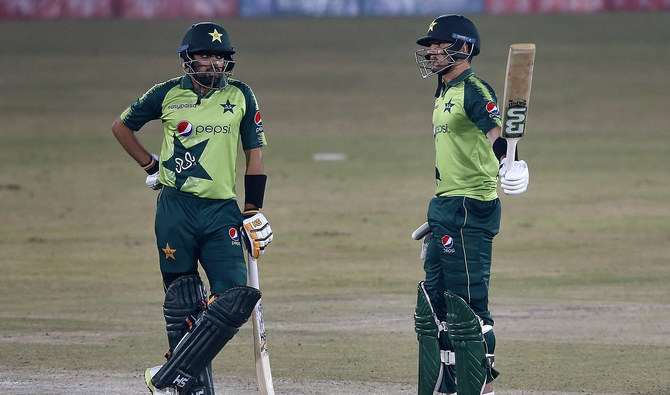
- Ali, 20, playing in only his third Twenty20, made an unbeaten 66 off 43 balls
- The win gave Pakistan an unassailable 2-0 lead in the three-match series after it beat the visitors by six wickets on Saturday
Pakistan, Malaysia resolve to boost cooperation in trade and other fields
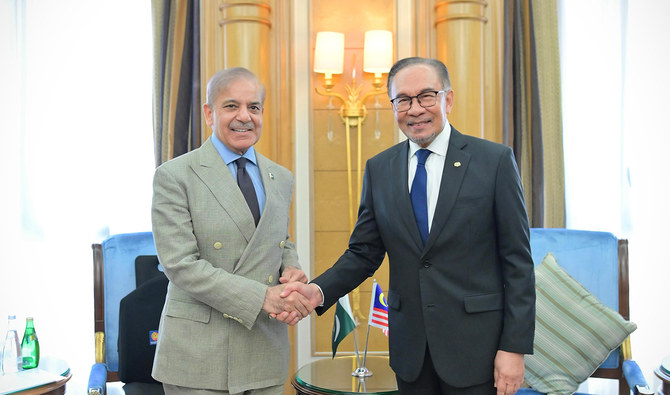
- The consensus was reached during a meeting between PM Shehbaz Sharif and his Malaysian counterpart on WEF sidelines in Riyadh
- Sharif invited Malaysian traders and businessmen to visit Pakistan to discuss expansion of bilateral trade, investment relations
ISLAMABAD: Pakistan’s Prime Minister Shehbaz Sharif and his Malaysian counterpart Anwar Ibrahim on Monday agreed to boost cooperation between the two countries in trade and other fields.
The consensus was reached during a meeting between the two leaders on the sidelines of a two-day World Economic Forum (WEF) summit in Riyadh, according to PM Sharif’s office.
During the meeting, both sides agreed to further develop relations.
“The two leaders mentioned the historic relations between Pakistan and Malaysia in the fields of education, science and technology, livestock and trade and vowed to further enhance cooperation in the future,” Sharif’s office said in a statement.
PM Sharif invited Malaysian traders and businessmen to visit Pakistan to discuss the expansion of bilateral trade and investment relations.
“The two leaders also agreed to hold the next meeting of the Joint Ministerial Commission in Islamabad soon,” the statement read. “The prime minister reiterated his invitation to Malaysian Prime Minister Anwar Ibrahim to pay an official visit to Pakistan.”
Sharif was in Riyadh to attend the WEF special meeting on Global Collaboration, Growth and Energy for Development on April 28-29.
The Pakistan premier spoke about Gaza at the closing plenary of the two-day summit and held several bilateral meetings, particularly with Saudi officials, during his visit.
No peace in the world without ceasefire in Gaza, Pakistani PM says at WEF
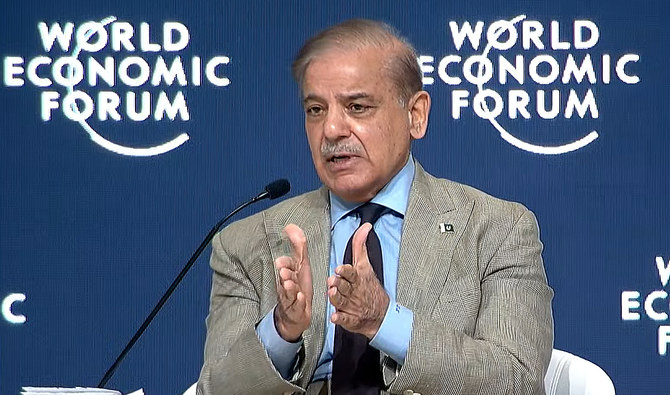
- Pakistan does not recognize Israel and calls for an independent Palestinian state based on pre-1967 borders
- Sharif is in Riyadh for two-day World Economic Forum summit on growth, has met top Saudi leaders on sidelines
ISLAMABAD: Pakistan Prime Minister Shehbaz Sharif said on Monday there could be no peace in the world without a permanent ceasefire in Gaza, as Israel’s attacks on the besieged Palestinians territory continue.
The statement came during the prime minister’s address at the closing plenary of a special two-day World Economic Forum (WEF) summit held in Riyadh, with a focus on global collaboration, growth and energy for development.
Israel’s air and ground assault on Gaza has killed about 34,500 Palestinians, according to Palestinian health authorities. The enclave is also in the grips of severe shortages of food, fuel and medicine since October 7 when the war started after attacks by Hamas on Israel.
“The world will not be in peace unless there is permanent peace in Gaza,” PM Sharif said.
Pakistan does not recognize the state of Israel and calls for an independent Palestinian state based on “internationally agreed parameters” and the pre-1967 borders with Al-Quds Al-Sharif as its capital.
Sharif said conflicts in Gaza, Ukraine and elsewhere had led to inflation globally, which was “breaking the back of developing countries.”
Sharif arrived in Riyadh on Saturday for the WEF special meeting on Global Collaboration, Growth and Energy for Development on April 28-29.
The conference has convened more than 700 participants, including key stakeholders from governments and international organizations, business leaders from the World Economic Forum’s partner companies, as well as Young Global Leaders, experts and innovators.
During his address, the Pakistan prime minister also thanked Saudi Arabia and other friendly countries for supporting Pakistan through difficult times.
“I have to acknowledge from the core of my heart the support we have been given and received from the Saudi leadership,” he said. “I think, a friend in need is a friend in deed and we will never be able to repay back to them what they have done to Pakistan in difficult times.”
Sharif said his government was going for “deep-rooted structural reforms” to put the country on the path to economic recovery.
“It will hit me as prime minister, obviously,” he said. “But ladies and gentlemen, without that nothing will happen.”
Pakistan is facing a chronic balance of payments crisis, with nearly $24 billion to repay in debt and interest over the next fiscal year, three-time more than its central bank’s foreign currency reserves.
The country is in talks with the International Monetary Fund (IMF) to secure a new loan program after its ongoing $3 billion program expires this month.
Pakistan, Saudi Arabia to take ‘concrete measures’ to boost bilateral trade — PM Sharif
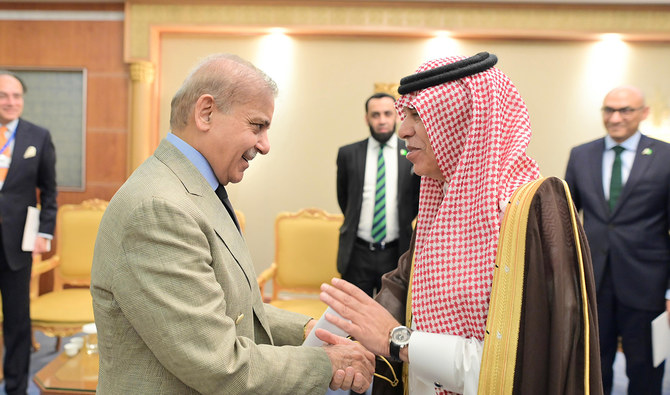
- Statement came after Shehbaz Sharif’s meeting with Saudi Commerce Minister Majid Al-Qasabi on WEF sidelines
- The WEF has convened a special meeting in Riyadh on global collaboration, growth and energy for development
ISLAMABAD: Prime Minister Shehbaz Sharif on Monday said Pakistan and Saudi Arabia would be taking “concrete measures” to boost the volume of bilateral trade between the two countries, Pakistani state media reported.
The statement came after PM Sharif’s meeting with Saudi Minister of Commerce Majid Al-Qasabi on the sidelines of a special meeting of the World Economic Forum in Riyadh.
Sharif informed the Saudi minister about the role of the Special Investment Facilitation Council (SIFC), set up in June, in promoting and facilitating the foreign investment.
“The Saudi minister told the prime minister that on the directives of Saudi Crown Prince and Prime Minister Mohammed bin Salman, the Kingdom was prioritizing trade and investment in Pakistan,” the state-run APP news agency reported.
“The Saudi minister said that the targets were being set to take the bilateral ties to a new height within one or one-and-half years.”
On the occasion, PM Sharif noted that Pakistani nationals had played a significant role in the progress and prosperity of Saudi Arabia, according to the report.
The Saudi commerce minister stressed the need to further promote Pakistan-Saudi Arabia ties among the youth.
Sharif arrived in Riyadh on Saturday to attend the WEF summit on global collaboration, growth and energy on April 28-29. The conference has convened more than 700 participants, including key stakeholders from governments and international organizations, business leaders from the WEF partner companies as well as young global leaders, experts and innovators.
After being on a number of panels at the WEF event on Sunday and holding several sideline meetings, the prime minister will address the closing plenary of the summit today, Monday, and also meet a number of top Saudi officials.
On Sunday, Sharif attended a Special Dialogue and Gala Dinner hosted by Crown Prince Mohammed bin Salman where they discussed bilateral ties as well as regional issues including the war in Gaza.
Sharif’s meeting with the crown prince took place less than a week after a high-powered delegation, headed by Saudi Foreign Minister Faisal bin Farhan, visited Pakistan to discuss investments.
“To continue the discussion, the Prime Minister said that he has brought with him a high-powered delegation to Riyadh, including key ministers responsible for investment, so that follow-up meetings could take place between relevant officials,” the Pakistani Prime Minister’s Office said.
Sharif reiterated his invitation to the Saudi crown prince for an official visit to Pakistan at his earliest convenience, the PMO added.
Pakistan and Saudi Arabia enjoy strong trade, defense and cultural ties. The Kingdom is home to over 2.7 million Pakistani expatriates and serves as the top source of remittances to the cash-strapped South Asian country.
Both Pakistan and Saudi Arabia have been closely working to increase bilateral trade and investment deals, and the Kingdom recently reaffirmed its commitment to expedite an investment package worth $5 billion.
Pakistan central bank holds key policy rate at 22 percent
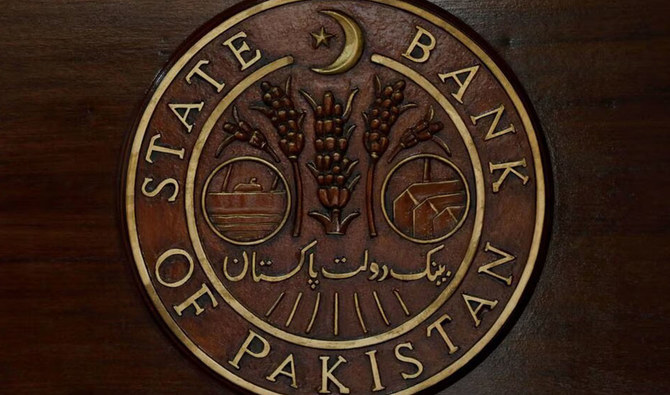
- Pakistan’s key rate was last raised in June to fight persistent inflationary pressures and to meet IMF conditions
- Reforms under IMF program have complicated task of keeping price pressures in check, however, inflation has slowed
KARACHI: Pakistan’s central bank kept its key interest rate unchanged at 22 percent for the seventh straight policy meeting on Monday, hours before the International Monetary Fund executive board meets to discuss the approval of $1.1 billion in funding for Pakistan.
Battling inflation and limited foreign exchange reserves, the cash-strapped South Asian nation is trying to navigate a path to economic recovery under a $3 billion standby arrangement with the IMF secured last summer to avert a sovereign default, and is hoping to sign a longer term program.
The bank’s monetary policy committee said in a statement that it was “prudent” to continue with its monetary policy stance at this stage to bring inflation down to the target range of 5 percent-7 percent by September 2025.
It added that it expected inflation to remain on a downward trajectory, but that recent oil price volatility poses a risk to the outlook. Consumers’ inflation expectations also edged up in April.
“In spite of the positive real interest rate, (the) Pakistan Central Bank rightly kept rates unchanged,” said Mohammed Sohail, chief executive at Topline Securities Ltd.
“This is mainly due to the risk of inflation remaining high in coming months due to higher global commodity prices and budgetary measures that may increase local prices,” he said.
Pakistan’s key rate was last raised in June to fight persistent inflation and to meet one of the conditions set by the IMF for securing the bailout. Reforms under the program have complicated the task of keeping price pressures in check. Inflation has slowed, however that has been primarily due to a high base effect.
Pakistan’s consumer price index (CPI) for March was up 20.7 percent from the same month last year, the lowest reading in nearly two years and below the finance ministry’s projections for the month.
Surging street crimes drive fear, misery into hearts of residents of Pakistan’s largest city

- According to media tallies, at least 62 people killed in incidents of street crime in Karachi this year
- Sindh Inspector General says new measures to prosecute criminals have led to higher convictions
KARACHI: With the aroma of Eid dinner still lingering in the air, Syed Turrab Hussain Zahedy left his apartment with a friend earlier this month to withdraw cash from an ATM near his roadside apartment in the teeming city of Karachi.
The muggers hit soon after they stepped out of the building and demanded they hand over their valuables. While his friend complied, Zahedy, 38, resisted and within minutes was shot dead, one among over 60 people who have been killed in attempted muggings and other incidents of street crime this year in Pakistan’s largest city and commercial hub.
Karachi, a metropolis of 20 million that hosts the stock exchange and central bank, has for decades been beset by armed violence. While an armed campaign by the military, with help from police, paramilitary Rangers and intelligence agencies, against armed gangs and suspected militants in the city brought down murder rates after 2013, street crimes have been on the rise again since last year, with shooting deaths in muggings and robberies once again becoming a daily headline.
The government in Pakistan’s southern Sindh province, of which Karachi is the capital, said last week it was intensifying efforts against street crimes but the families of victims remain hopeless, saying their loved ones have become mere statistics.
“My son, in the eyes of this government, was nothing but a moving insect,” Syed Nisar Hussain, Zahedy’s 75-year-old father, told Arab News. “He wasn’t considered a human being.”
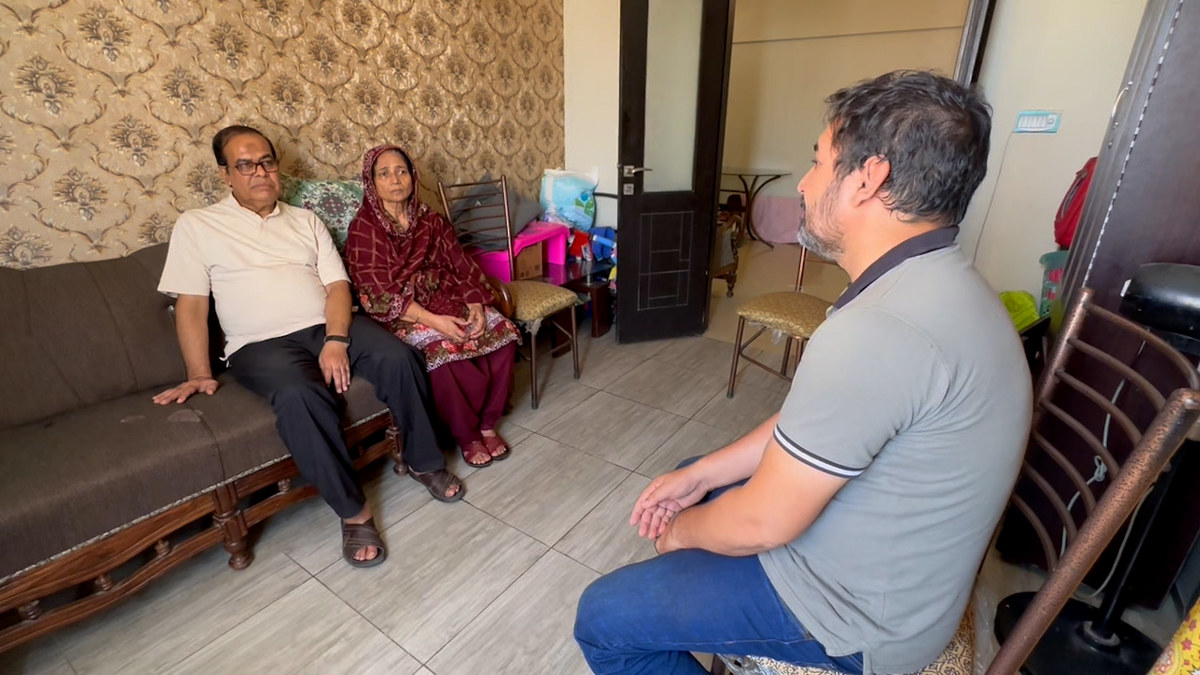
Hussain urged Pakistan’s prime minister, chief justice and army chief to step in to tackle the “terrorists” who were killing people on Karachi’s streets and lamented the criminal justice system in Pakistan where the conviction rate is very low, 11 percent, and where the failure of prosecutors to attain convictions in major as well as routine cases has badly eroded public confidence in the state’s ability to govern.
But Ghulam Nabi Memon, the inspector general of Sindh Police, said the force was now working overtime to wipe out crime, while acknowledging past neglect and mistakes.
“We have tasked good investigators to investigate cases of street crimes,” Memon told Arab News. “Additionally, we have requested the government to give us prosecutors who may help investigators in the collection of evidence.”
He said police had announced rewards and incentives for investigation officers who prosecuted cases successfully, saying such measures had already boosted the conviction rate in Karachi from less than 10 percent to 24 percent, the highest in Pakistan.
“While we are working hard to stop these killing ... overall, the incidents of crimes have decreased, which shows that police is doing its job,” Memon added.
But many Karachi residents say the feeling of insecurity has only grown.
Abdul Rahim Gul, 50, who works in the real estate business, said frequent mobile phone and car snatchings near his home and office had forced him to hire guards from a private security company six months ago.
“We have installed CCTV cameras and hired guards,” Gul lamented. “We can’t afford it but we have to do it.”
Sayida Rikshenda Jabeen, Zahedy’s 67-year-old mother, still does not know how to cope with the killing of her son, who is survived by his parents, a wife and three children between the ages of six months and six years.
“Just now, my little granddaughter was asking, ‘Grandma, where is Papa?’ What should I tell her?” Jabeen asked.
The sounds of ambulance sirens outside the Zahedys roadside apartment had also become a daily reminder of the “horrors” that lurked on the streets outside.
Scrolling through photos of her son on a cell phone, Jabeen asked the police, government and criminals:
“How many mothers’ hearts will you break? How many mothers’ laps will you people destroy?”










